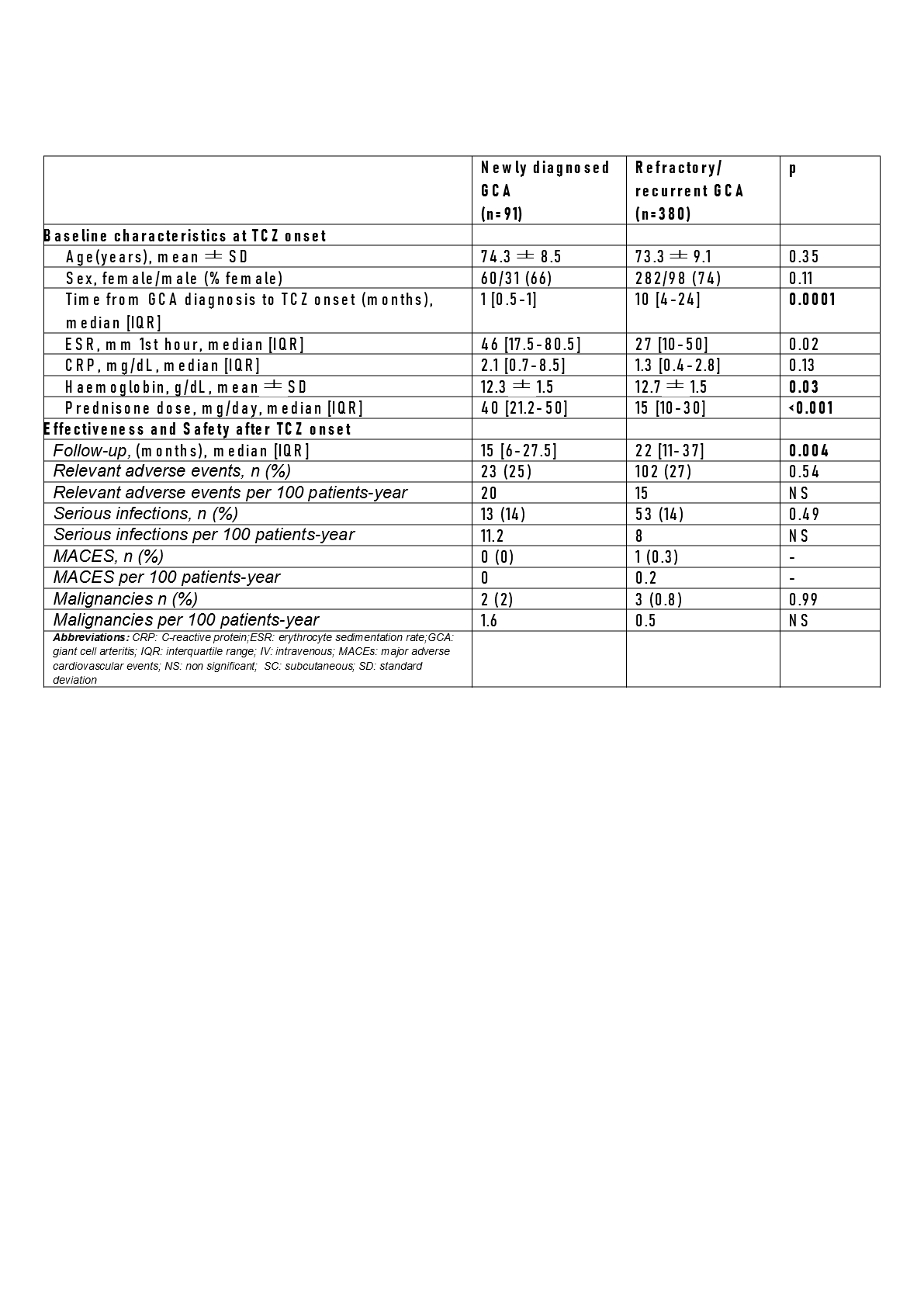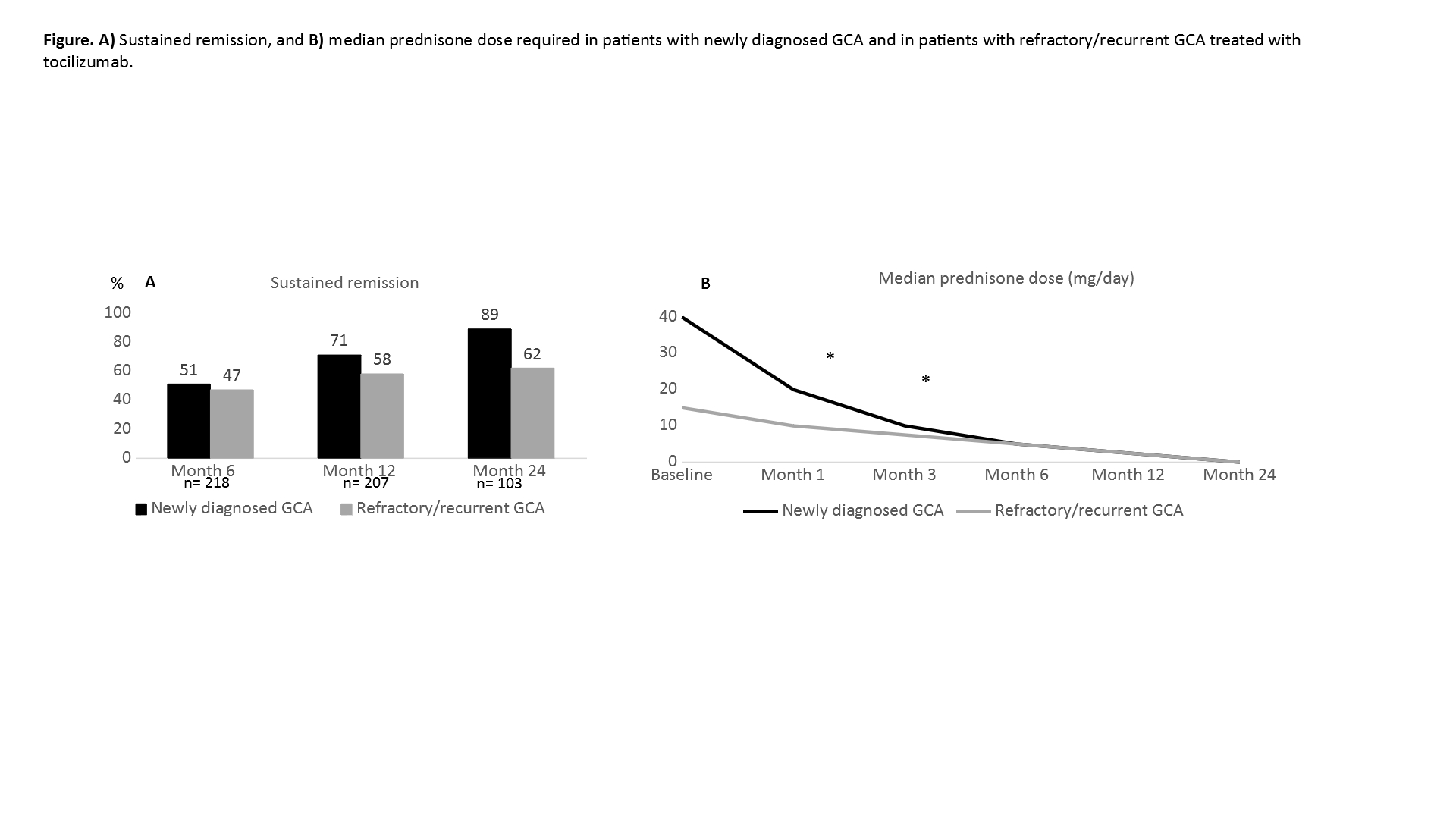Back
Poster Session A
Vasculitis
Session: (0458–0497) Vasculitis – Non-ANCA-Associated and Related Disorders Poster I: Giant Cell Arteritis
0485: Assessing the Effectiveness of Tocilizumab in Newly Diagnosed Giant Cell Arteritis versus Refractory/recurrent Giant Cell Arteritis in Clinical Practice
Saturday, November 12, 2022
1:00 PM – 3:00 PM Eastern Time
Location: Virtual Poster Hall
- JS
Julio Sanchez Martin, MD
Hospital Universitario Marqués de Valdecilla
Santander, Spain
Abstract Poster Presenter(s)
Julio Sánchez-Martín1, Javier Loricera2, Clara Moriano3, Santos Castañeda4, F. Javier Narváez5, Vicente Aldasoro6, Olga Maiz7, Rafael Melero8, Juan Ignacio Villa Blanco9, Paloma Vela-Casasempere10, Susana Romero Yuste11, José Luis Callejas12, Eugenio De Miguel13, Eva Galíndez-Agirregoikoa14, Francisca Sivera15, Jesus Fernandez16, Carles Galisteo17, Ivan Ferraz Amaro18, Lara Sánchez-Bilbao1, Monica Calderon-Goercke19, Miguel Ángel González-Gay20 and Ricardo Blanco2, 1Hospital Universitario Marqués de Valdecilla, Santander, Spain, 2Hospital Universitario Marqués de Valdecilla, IDIVAL, Santander, Spain, 3Complejo Asistencial Universitario de León, León, Spain, 4Division of Rheumatology, Hospital Universitario de La Princesa, IIS-Princesa, Madrid, Spain, 5Rheumatology Department, Hospital Universitario de Bellvitge, Barcelona, Spain, 6Hospital Universitario de Navarra, Pamplona, Spain, 7Hospital Universitario de Donostia, San Sebastián, Spain, 8Complexo Hospitalario Universitario de Vigo, Vigo, Spain, 9Sierrallana Hospital, Torrelavega, Spain, 10Hospital General Universitario Alicante, Alicante, Spain, 11Complexo Hospitalario Universitario, Pontevedra, Spain, 12Hospital San Cecilio, Granada, Spain, 13Hospital Universitario La Paz, Madrid, Spain, 14Basurto University Hospital, Bilbao, Spain, 15Hospital Universitario de Elda, San Vicente del Raspeig, Spain, 16Hospital de La Coruña, La Coruña, Spain, 17Hospital Parc Tauli,, Sabadel, Spain, 18Division of Rheumatology. Hospital Universitario de Canarias. Spain., Santa Cruz de Tenerife, Spain, 19Hospital de Sierrallana, Torrelavega, Spain, 20Department of Medicine and Psychiatry, Universidad de Cantabria; Rheumatology Division, Hospital Universitario Marqués de Valdecilla; Research group on genetic epidemiology and atherosclerosis in systemic diseases and in metabolic diseases of the musculoskeletal system, IDIVAL, Santander, Spain. Cardiovascular Pathophysiology and Genomics Research Unit, School of Physiology, Faculty of Health Sciences, University of the Witwatersrand, Johannesburg, South Africa
Background/Purpose: Tocilizumab (TCZ) is the only biologic drug approved in giant cell arteritis (GCA), based in two clinical trials (CT) (1,2). CT included selected patients who may differ from those of clinical practice (CP). A high proportion of GCA patients treated with TCZ in CT had a newly diagnosed GCA, whereas in CP, most of them are refractory/recurrent GCA (3,4). Although in CT the efficacy of TCZ seems to be similar in patients with newly diagnosed GCA and in patients with refractory/recurrent GCA, in CP it is not documented.
The purpose of this study is to compare in CP, the effectiveness and safety of TCZ in newly diagnosed vs refractory/recurrent GCA.
Methods: Multicentre observational study on 471 GCA patients treated with TCZ. GCA was diagnosed by: a) ACR criteria, and/or b) temporal artery biopsy, and/or c) imaging techniques.A comparative study between patients with newly diagnosed GCA (< 6 weeks) and those with refractory/recurrent GCA ( >6 weeks) (according to GiACTA study definitions) (2). Sustained remission was based on EULAR definitions (5).
Results: The 471 GCA patients were divided into 2 subgroups: a) newly diagnosed GCA (n=91) and b) refractory/recurrent GCA (n=380) (TABLE).No significant differences were observed between both groups in sustained remission, although a greater tendency towards sustained remission is observed in newly diagnosed than in refractory/recurrent GCA patients (FIGURE). The decrease in glucocorticoids dose was faster in the first three months in the newly diagnosed GCA group, but thereafter, was similar in both groups, as well as the appearance of relevant adverse events and serious infections.
Conclusion: The effectiveness and safety of TCZ seems to be similar in patients with newly diagnosed GCA and in patients with refractory/recurrent GCA.
References
1. Villiger PM, et al. Lancet. 2016; 387:1921-1927. PMID: 26952547
2. Stone JH, et al. N Engl J Med. 2017; 377:317-328. PMID: 28745999
3. Calderón-Goercke M, et al. Semin Arthritis Rheum. 2019; 49: 126-135. PMID: 30655091
4. Calderón-Goercke M, et al. Clin Exp Rheumatol. 2020; 124: S112-119. PMID: 32441643
5. Hellmich B, et al. Ann Rheum Dis. 2020; 79: 19-30. PMID: 31270110
 Main features of patients with newly diagnosed GCA and refractory/recurrent GCA treated with tocilizumab.
Main features of patients with newly diagnosed GCA and refractory/recurrent GCA treated with tocilizumab.
 A) Sustained remission, and B) median prednisone dose required in patients with newly diagnosed GCA and in patients with refractory/recurrent GCA treated with tocilizumab.
A) Sustained remission, and B) median prednisone dose required in patients with newly diagnosed GCA and in patients with refractory/recurrent GCA treated with tocilizumab.
Disclosures: J. Sánchez-Martín, None; J. Loricera, Novartis, UCB, Celgene, Roche; C. Moriano, None; S. Castañeda, Roche; F. Narváez, None; V. Aldasoro, None; O. Maiz, None; R. Melero, None; J. Villa Blanco, None; P. Vela-Casasempere, None; S. Romero Yuste, Pfizer, Lilly, AbbVie, Biogen, Sanofi; J. Callejas, None; E. De Miguel, None; E. Galíndez-Agirregoikoa, None; F. Sivera, None; J. Fernandez, None; C. Galisteo, None; I. Ferraz Amaro, AbbVie/Abbott, Merck/MSD, Janssen, Roche, AbbVie/Abbott, Pfizer, Roche, Amgen, Celgene, Merck/MSD; L. Sánchez-Bilbao, Eli Lilly; M. Calderon-Goercke, None; M. González-Gay, AbbVie/Abbott, Merck/MSD, Janssen, Roche, AbbVie/Abbott, Roche, Sanofi, Eli Lilly, Celgene, Sobi, Merck/MSD; R. Blanco, Eli Lilly, Pfizer, Roche, Janssen, MSD, AbbVie, Amgen, AstraZeneca, Bristol Myers Squibb, Galapagos, Novartis, Sanofi.
Background/Purpose: Tocilizumab (TCZ) is the only biologic drug approved in giant cell arteritis (GCA), based in two clinical trials (CT) (1,2). CT included selected patients who may differ from those of clinical practice (CP). A high proportion of GCA patients treated with TCZ in CT had a newly diagnosed GCA, whereas in CP, most of them are refractory/recurrent GCA (3,4). Although in CT the efficacy of TCZ seems to be similar in patients with newly diagnosed GCA and in patients with refractory/recurrent GCA, in CP it is not documented.
The purpose of this study is to compare in CP, the effectiveness and safety of TCZ in newly diagnosed vs refractory/recurrent GCA.
Methods: Multicentre observational study on 471 GCA patients treated with TCZ. GCA was diagnosed by: a) ACR criteria, and/or b) temporal artery biopsy, and/or c) imaging techniques.A comparative study between patients with newly diagnosed GCA (< 6 weeks) and those with refractory/recurrent GCA ( >6 weeks) (according to GiACTA study definitions) (2). Sustained remission was based on EULAR definitions (5).
Results: The 471 GCA patients were divided into 2 subgroups: a) newly diagnosed GCA (n=91) and b) refractory/recurrent GCA (n=380) (TABLE).No significant differences were observed between both groups in sustained remission, although a greater tendency towards sustained remission is observed in newly diagnosed than in refractory/recurrent GCA patients (FIGURE). The decrease in glucocorticoids dose was faster in the first three months in the newly diagnosed GCA group, but thereafter, was similar in both groups, as well as the appearance of relevant adverse events and serious infections.
Conclusion: The effectiveness and safety of TCZ seems to be similar in patients with newly diagnosed GCA and in patients with refractory/recurrent GCA.
References
1. Villiger PM, et al. Lancet. 2016; 387:1921-1927. PMID: 26952547
2. Stone JH, et al. N Engl J Med. 2017; 377:317-328. PMID: 28745999
3. Calderón-Goercke M, et al. Semin Arthritis Rheum. 2019; 49: 126-135. PMID: 30655091
4. Calderón-Goercke M, et al. Clin Exp Rheumatol. 2020; 124: S112-119. PMID: 32441643
5. Hellmich B, et al. Ann Rheum Dis. 2020; 79: 19-30. PMID: 31270110
 Main features of patients with newly diagnosed GCA and refractory/recurrent GCA treated with tocilizumab.
Main features of patients with newly diagnosed GCA and refractory/recurrent GCA treated with tocilizumab.  A) Sustained remission, and B) median prednisone dose required in patients with newly diagnosed GCA and in patients with refractory/recurrent GCA treated with tocilizumab.
A) Sustained remission, and B) median prednisone dose required in patients with newly diagnosed GCA and in patients with refractory/recurrent GCA treated with tocilizumab.Disclosures: J. Sánchez-Martín, None; J. Loricera, Novartis, UCB, Celgene, Roche; C. Moriano, None; S. Castañeda, Roche; F. Narváez, None; V. Aldasoro, None; O. Maiz, None; R. Melero, None; J. Villa Blanco, None; P. Vela-Casasempere, None; S. Romero Yuste, Pfizer, Lilly, AbbVie, Biogen, Sanofi; J. Callejas, None; E. De Miguel, None; E. Galíndez-Agirregoikoa, None; F. Sivera, None; J. Fernandez, None; C. Galisteo, None; I. Ferraz Amaro, AbbVie/Abbott, Merck/MSD, Janssen, Roche, AbbVie/Abbott, Pfizer, Roche, Amgen, Celgene, Merck/MSD; L. Sánchez-Bilbao, Eli Lilly; M. Calderon-Goercke, None; M. González-Gay, AbbVie/Abbott, Merck/MSD, Janssen, Roche, AbbVie/Abbott, Roche, Sanofi, Eli Lilly, Celgene, Sobi, Merck/MSD; R. Blanco, Eli Lilly, Pfizer, Roche, Janssen, MSD, AbbVie, Amgen, AstraZeneca, Bristol Myers Squibb, Galapagos, Novartis, Sanofi.

